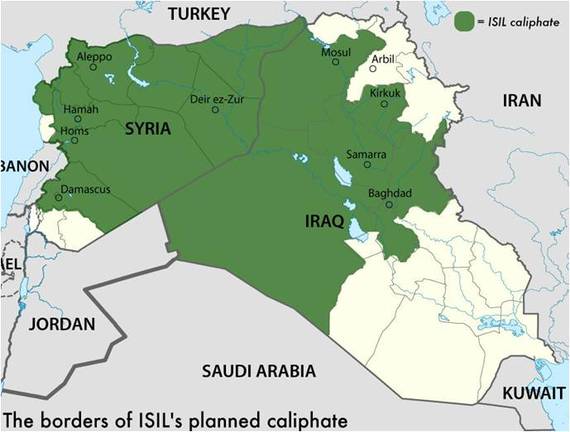Source: the Global Post, based on a map tweeted by ISIL in March 2014
Situation in August 2014: The Islamic state in Iraq and Syria (ISIS) released a message to America with the video of the beheading of American journalist and reporter in Syria kidnapped in 2012, James Foley. In his statement, President Barack Obama strongly condemned the acts of violence of ISIS, comparing the group to a "cancer" whose spread must be contained, saying it has and will continue to torture and kill civilians, massacre religious minorities and rape women.
Sources from the Guardian identify the manhunt of Foley in an English jihadist, who is believed to be the leader of a group of British fighters in Raqqa, a stronghold of ISIS rebels, holding foreign hostages in Syria.
ISIS is trying to establish its own Sunni state, the so-called Islamic Caliphate, across borders that have their origins in the Ottoman Empire and post-World War I diplomacy. The Caliphate wants to unite Muslims under its house of Islam, where all are to be united by the same religion and the same divine law, Sharia. Unlike Osama Bin Laden though, who conceived the Islamic Caliphate as a virtual global one, Abu Bakr Al-Baghdadi is now envisioning it as a territorial one, where all Sunni Muslims must be included in the territory, with Baghdad at the center of the Caliphate.
Sunni Muslims are conquering the territory by eliminating religious minorities ( Yazidis, Shiites, Christians, Kurds) to revenge their initial territory.
On one hand we see Iran supporting the Shiites, the Western World ( US and Europe) is supporting the Kurds but also the Shiites. In Iraq, Iran and the Western world seem to be following the same geopolitical strategy. Abu-Bakr Al Baghdadi is in the meantime recruiting young Europeans radicals fascinated by the narrative of jihad and the reconstitution of the Islamic caliphate to fight on the fields.
About a possible military intervention, the United States of America disengaged from the Iraqi war but it is now sending humanitarian air drops to assist the Yazidis, who are trapped on Mount Sinjar by ISIS without food or water. Moreover, on August 15th the EU ministers for Foreign Affairs met in Brussels to discuss the emergency situation in Iraq, Ukraine and Libya, Gaza and the Ebola crisis in West Africa.
The council of the European Union reiterated its commitment to Iraq's unity, sovereignty and territorial integrity. EU members states will be supporting the US military troops in providing humanitarian aid and welcomed the commitment of additional European funds as well as the mobilization of the European Emergency Response coordination centre and the activation of the European Union Civil Protection Mechanism at the request of the Iraqi government, to deliver assistance in kind including through the establishment of a humanitarian air bridge to northern Iraq adapted to the needs in the field.
The Council also welcomed the decision by individual member states to respond positively to the call by the Kurdish regional authorities to provide urgently military material. As of now, France, Czech Republic and Italy are preparing and agreed to send military aid for Iraq, whereas the U.K. would look "favorably" on Iraqi requests for weapons supply to Kurdish Peshmerga fighters who have been struggling to hold back an offensive by ISIS.
On Wednesday Germany (legally prevented from arming countries involved in conflict) broke with post-war tradition and agreed to supply weapons to Iraq to combat Islamist militants in an announcement coinciding with a decision in Washington to intensify military strikes in the region.
A day before, on August 14th, Nouri Al Maliki stepped down as prime minister of Iraq and Mr. Heider Al Abadi was nominated as prime minister-designate to support the constitutional process of the country.
What are we doing with Iraq?
I asked this question to Professor Olivier Roy, Senior Researcher at the European University Institute (Firenze, Italy) specialized in the Middle East, Political Islam, Islam in the West and comparative religions. Author of Globalized Islam (Columbia University press, 2004) and more recently The Holy Ignorance Seuil, 2008. Visiting professor at Berkeley University, he made some clear points on the Islamic Caliphate and the Western world in Iraq.
The key -- Professor Roy states -- is the "formation of a new government that needs to be inclusive and needs to address the needs and legitimate aspirations of the Iraqi citizens." With a military intervention or operation from external troops, "all the process could be null and could not have the potentials to reinforce the credibility of democratic institutions, thus paving the way to a political solution of the current crisis."
As Professor Roy points out,
"An intervention is not the solution, it is useless because after 2003 there is no need of another confrontation between Islam and the Western World and not worth it, because the western world wants the support from legitimate forces in the country, namely the Kurds and the Shiites."
The fundamental issues at stake- Professor Roy continues-are two: one in the short-term and one in the long-term. "In the short term, the Kurds and the Shiites should start negotiations for territorial integrity, establishing a place for autonomy to define the modus operandi for the independence of Kurdistan."
In the long-term "an international conference gathering the US, Europe, Russia, Iran, Iraq, Saudi Arabia, Turkey, as well as Kurds, Sunnis and Shiites is needed, to rethink the geopolitical dimension of the territories and, to re-define and/or to create new frontiers."
Ensuring political stability, legitimacy of Iraq on one hand, and negotiating for peace and new territorial frontiers on the other one, can prevent another world war.

